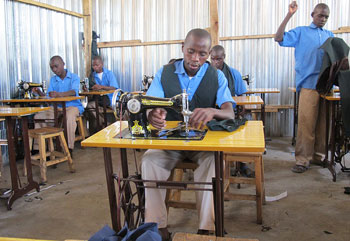Rwanda’s Government has promoted its youth since they are the future of the country. Instead of drowning in drug abuse, street life and other social vices, they are taught the importance of economic, social and cultural development of the country.


Rwanda’s Government has promoted its youth since they are the future of the country. Instead of drowning in drug abuse, street life and other social vices, they are taught the importance of economic, social and cultural development of the country.
In February 2010, the Rehabilitation and Skills Development Centre at Iwawa Island was set up with an intake of 1,069 youth. They were taken off the streets and rehabilitated at Iwawa Island located in Lake Kivu, Rutsiro District in the Western Province of Rwanda.
Young men between the ages of 18 to 35 years live at the center and are given a second chance in life to have a fair fight on the job market.
The programme is an initiative of the Ministry of Youth and other stakeholders to help delinquents that lived on the streets of Kigali to become responsible and productive citizens.
According to Serge Nzabonimana, the Advisor to the Ministry of Youth, the youth brought at the island were involved in petty crimes and needed guidance to become better citizens.
"The solution to the petty crimes committed by delinquent youth is not imprisonment. They need to be rehabilitated in order to change their behaviour and develop a value system that will support them to become responsible and productive citizens,” Nzaboimana explained.
Delinquent youth are got from the streets then taken to Gikondo transit center for a week. During their time there, they are monitored to find out if they have been culprits more than twice before they are taken to the island and rehabilitated.
There are no other residents besides the Police and Marine. Since the center opened in 2010, it has become home to 590 other youth.
The topography of the area provides a conducive environment for the rehabilitation programme. It takes a 35 to 45 minute ride on a speed boat to reach the island—an obvious barrier for the escape- minded drug addicts and juveniles.
Nicolas Niyongabo, the Coordinator of the centre said that although it’s expensive to run the facility, it’s an ideal place to rehabilitate the youth.
"The Government previously set up a similar center in Mushubi, in Nyamangabe District (Southern Rwanda) but several youth escaped to Kigali city,” Niyongabo said.
"On this Island, youth get time to settle and think of what is important in life and begin to focus on their future. While on the streets they never mind about what tomorrow holds. The trainings they get here, will be the basis of a new start in life because they will graduate at the end of this month,” Niyongabo explained.
The youth are always excited when they see visitors. They sing and jubilate about their change in life.
Fidele Nshimiyimana, 20 years, said that their kind of lifestyle can be compared to students in a boarding school.
"We wake up at 6:00 a.m and bathe before breakfast which is always porridge. Each of us then goes to their specific classes. I have mastered in the Bee Keeping project which is one of the training courses offered here,” Nshimiyimana said.
"After graduation I will go back and seek for forgiveness from my parents in Cyangugu (Western province). I want to resume studying or start up a Beekeeping business,” he adds.
After an hour-long lunch break at 1:00 p.m, students resume classes until 5:00 p.m. Thereafter they are entertained on a 56 inch television set that is connected to DSTV, a popular satellite television provider in Africa. They watch soccer games and other entertainment shows.
The centre has three educational components; rehabilitation, skills training and Civic education training.
The rehabilitation phase is composed of a number of courses that enable the youth to change their behaviour.
Civic education ensures that they gain a better understanding of Rwandan values and systems so that they can become active citizens.
Career guidance and support is also given to all young people at the centre. The main aim of the centre is to re-introduce young people into society and enable them to find employment. Graduates will be able to access internship and apprenticeship opportunities.
At 35 years, Patrick Ndayisabye is one of the oldest men at the centre. He said that his lack of education and transcripts denied him access to employment. As a result, he depended on petty jobs for a scanty pay that he spent on drugs.
"I got involved in several social vices such as drug abuse and its related dangers,” Ndayisabye said. He is a reformed man now with great plans for his future.
"When I graduate I will use my Certificate to search for a decent job and I will lead a better life since I have majored in construction while at the Island,” Ndayisabye added.
Out of the 1,659 youth at Iwawa Island, 590 are undergoing the rehabilitation phase. Among those who will graduate in April 2011, are: 143 trained in Carpentry, 146 in Tailoring, 206 in Beekeeping, 219 in Commercial Farming techniques and 355 in Construction.


